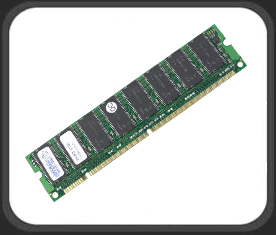| Memory 'Buy' The Numbers - Page 2 of 4 |
RAM Mathematics
Now that you’ve probably learned more about RAM than you ever wanted to know, let’s start looking at what you do want to know. As I call it...RAM Math. RAM Math is almost as bad as CPU Math, probably because it comes from some of the same engineers! We all know when engineers get involved it gets complicated. Well maybe not complicated, but confusing to say the least. So let’s take a look at some of this “special” math and see if I can clear the fog of war a little about it.
They Lie, Size Does Matter
Let us first take a look at “size”. This is one of those cases where size does matter (I’m sure it matters in other matters, but let’s just not go there). Size in RAM is measured in “Meg’s” or MegaBytes (MB for short). Because you’re a computer science major you of course already know about bits and Bytes right? No, you’re not a computer science major? Fine! Let’s take a quick look at that then.
As described previously, the smallest piece of information a computer uses is called a bit (a 0 or a 1). When you put 8 of these bits together you get a Byte (remember... we’re doing engineer math here... don’t try to understand it, just go with it). Now when 1024 Bytes get together you have a KiloByte (or KB). Next when you mob 1024 KiloBytes together you end up with 1 MegaByte (or MB). So for every MB you have 8,388,608 bits.
(Take note, that when you go to get your broadband connection, it’s a MegaBIT or KiloBIT connection, not a MegaByte or KiloByte... and considering that 8 bits = 1 byte… your not getting as much as they are trying to make you think your getting! So don’t be confused by the marketing hype.)
Keep all of this in mind when you boot up your computer knowing you have 512MB of RAM, but the system counts up 524288 KiloBytes (512 x 1024 = 524288). The company that made the RAM didn’t like you and throw in some extra memory for free, it’s RAM math. As I said, size does matter. So when it comes to figuring out how much memory your system needs, there are a few basic rules you should follow:
| Operating System |
Minimum Memory |
Recommended Memory |
| Windows 95 |
32MB |
128MB |
| Windows 98 |
64MB |
256MB |
| Windows 2000 |
128MB |
512MB |
| Windows XP |
256MB |
512MB |
Now remember, these rules are for the minimum memory you can run your computer on to get a good experience. Depending on how you use it, how many programs you have open at once, and what type of applications you run it’s not inconceivable to DOUBLE these numbers. My personal preference as of the writing of this article is on Windows 2000 or Windows XP to run 1GB (or 1024MB) of memory. I have noticed a much smoother feel on a system running 1 Gig over a system running 512 Meg’s.
SDRAM:
The next number we need to look at is the speed or “PC’ rating (no, not how politically correct it is). Back in the early days of SDRAM memory started out as PC66, where the 66 represents how fast the memory clock was (66 MHz). From there we moved on to PC100 and PC133. If you are running an AMD K6-2 or Intel Pentium III you are probably running PC100 memory. This may also hold true for early AMD Athlon & Duron systems. The next step and most current “standard” SDRAM is PC133. This is used by later model Athlon, Duron, and Pentium III systems. You may have also seen memory marked as PC150 and PC166, and these pieces of RAM were not operating under any approved JEDEC standard. They were normally just PC133 spec’ed memory that was tested and able to be run at faster, or overclocked speeds. If you we not overclocking your system, they were simply a waste of money.

Example of SDRAM Memory
Please read on to the next page for more... Next
Page 1 | Page 2 | Page 3 | Page 4 | Home | Forum | Review Index
|
|
|
|